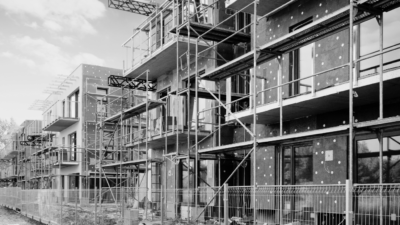Owners of flats in buildings without cladding will no longer need an EWS1 form to sell or re-mortgage their property – thanks to an agreement reached today (21 November) between the Government and the Royal Institution of Chartered Surveyors (RICS), UK Finance and the Building Societies Association (BSA).
This is part of a wider government-led solution to support those homeowners who have unsafe cladding on their buildings and where there is still more to do.
Developed by industry to assess the potential financial impact of cladding on high-rise flats, an external wall fire review process – commonly referred to as ‘EWS1’ – is being applied to other buildings without cladding. This is stopping some people from selling or moving home and causing unnecessary anxiety for homeowners.
Mr Jenrick and RICS have agreed that buildings without cladding do not need an EWS1 form, clearing the way for up to nearly 450,000 flat owners to sell, move or remortgage their homes.
While building owners are already legally required to undertake fire risk assessments on all blocks of flats, following supplementary guidance published by the Government today, RICS will be working with lenders, valuers and fire safety bodies to develop new advice for surveyors. This will enable surveyors to take a more proportionate approach and reduce the number of buildings where an EWS1 assessment is needed.
Further, the Government has announced nearly £700,000 to train more assessors, speeding up the valuation process for homeowners in cases where an EWS1 form is required. This training will be delivered by RICS from January and will mean up to 200 additional assessors will be qualified to carry out the EWS1 assessment within a month, 900 within three months, and 2,000 within six months.
The Government is also exploring ways to address ongoing concerns around the availability of professional indemnity insurance and welcomes industry’s progress on developing a portal where lenders, valuers and leaseholders will be able to find out if their building already has an existing EWS1, thereby reducing the demand for duplicate forms.
Housing Secretary Rt Hon Robert Jenrick MP said:
“Through no fault of their own, some flat-owners have been unable to sell or re-mortgage their homes - and this cannot be allowed to continue.”
“That’s why the Government has secured agreement that the EWS1 form will not be needed on buildings where there is no cladding; providing certainty for the almost 450,000 homeowners who may have felt stuck in limbo. However, this is only part of a wider solution and we continue to support those homeowners who do have cladding on their buildings and where there is still more to do.”
“I welcome the support we have received from RICS and industry to resolve this matter and will be working urgently with lenders to resolve these challenges, ensuring that EWS1 forms are requested only where absolutely necessary and that the number of surveyors able to complete them is increased urgently to meet demand.”
RICS CEO Sean Tompkins said:
“We are aware of the severe impact this has had on some homeowners and we agree that buildings without cladding should not be subject to the process. We will be taking forward work with industry on this.”
“Further, we recognise the acute market shortage of fire engineers to carry out EWS1 assessments and welcome the Government’s support on working with us to upskill other regulated professions, such as Chartered Building Surveyors, to create additional capacity in the market.”

























So for those flats below 18m that have cladding and wooden balconies they are not covered by the the £1.5 billion Govt remediation fund which is only for properties above 18m.
So now any flat below 18m has no cover at all.
Even a bit of decorative cladding on a block of flats renders all flats worthless.
Wooden balconies the same.
Remediation costs paid by leaseholders would be unviable.
It means that mist flat owners would be better off going bankrupt.
Lenders will then have to pay for the remediation costs if they ever hope to sell.
Very few cash buyers would risk buying a flat unless they were able to factor in what they thought would be the approximate remediation costs.
But potentially lenders will be left with unsaleable flats numbering in the millions.
2.5 million defaulted mortgages could collapse banks causing a run on them.
Govt would have to bail out banks again.
Paying £15 billion to fix all these flats is a far cheaper option than the costs Govt would incur to bail the banks out again!
Ahh!!
Forgot to mention as well that if lenders repossess these 2.5 million flats they won’t be able to let them out until an EWS1 form has bern produced and any relevant remediation works carried out.
There is NO chance of banks being able to recover losses from leaseholders who will invariably be discharged from bankruptcy after a year.
Lenders of course have up to 12 years to recover mortgage debt losses.
So that means any flat owner cannot buy in their own name as all a lender would do is slap a charge on the new property and then force the sale of the property to obtain all the available equity.
Effectively this means flat owner’s lives will be on hold for minimum if 12 years plus invariably they will have needed to go bankrupt.
A big problem for many flat owners that if bankrupted they could lose their jobs especially if they work in thr financial industry.
The ramifications of this cladding crisis are huge.
It will cause massive social issues whilst costing billions for lots of people and banks.
It would definitely affect UK economic performance far more in cost than the relatively minor £15 billion in remediation costs.
Govt needs to grasp the proverbial bull by the horns and resolve this cladding crisis quickly.